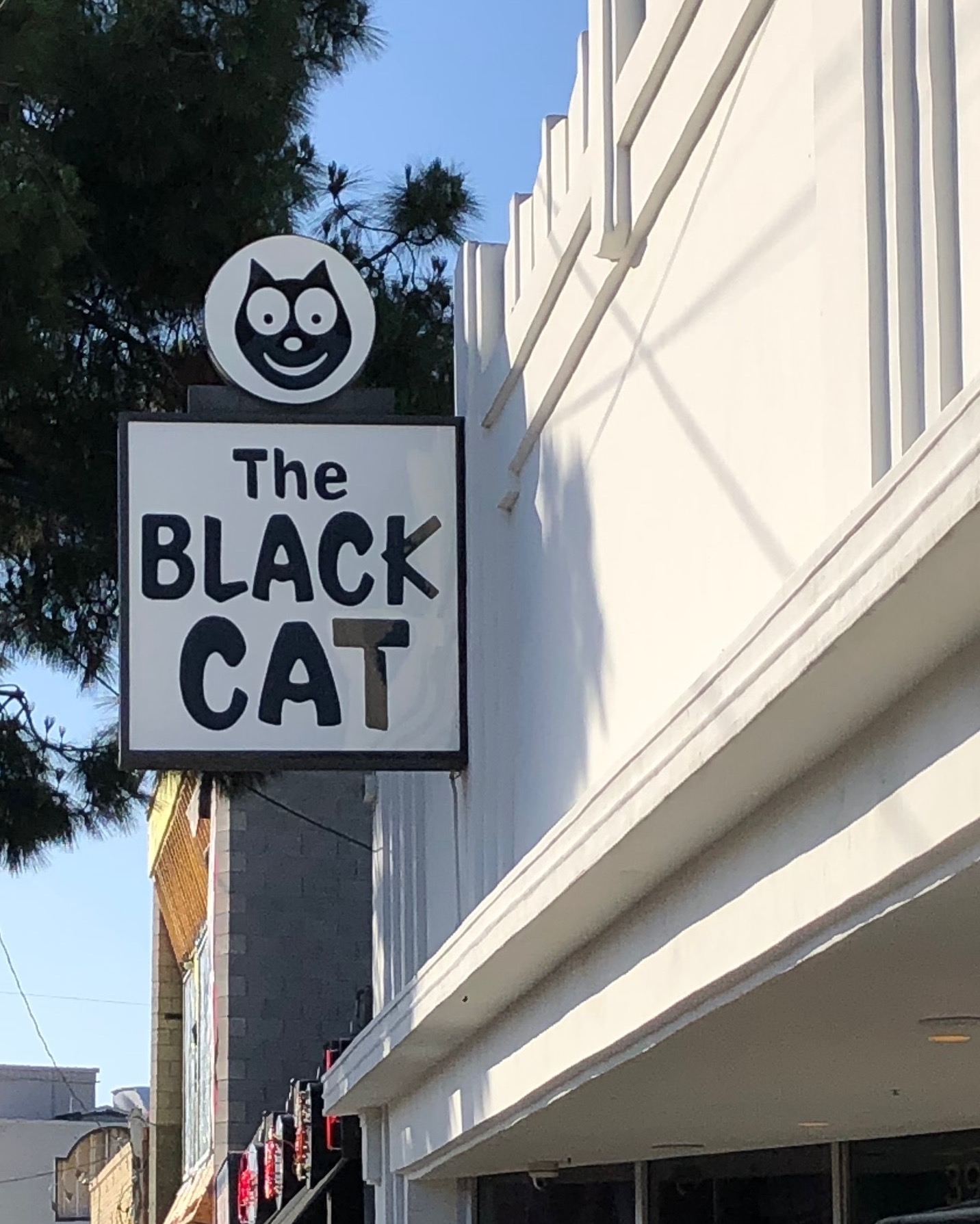A Riot in Name Only It’s rare that The G&LR itself makes it into this column, but here goes. A well-researched piece in  lgbtq-Nation.com has called us out for an essay that appeared in our 25th-anniversary book In Search of Stonewall. The essay is titled “The Black Cat Riot in L.A.” (from May–June 2012), by Eve Goldberg, and author Michael Bedwell contends that it repeats a myth that has become a meme: the claim that a “riot” took place at the Black Cat bar in L.A.’s Silver Lake district on New Year’s morning, 1968. There was certainly a police raid, and an especially brutal one, but Bedwell can find no evidence of resistance—no police reports, no eyewitness accounts, no photographs—that would justify the word “riot.” Indeed, no one really argues that a riot took place, including Eve Goldberg, yet the label “Black Cat Riot” has stuck: it’s what you would google to find out about this event. Nor is this usage just a rhetorical matter: it has led to the oft-made claim that the Black Cat bar and not the Stonewall Inn is the true site of the first gay uprising and should be celebrated as such. What is the case (and what Eve Goldberg mostly talks about) is that a major gay rights demonstration took place about a month later outside the Black Cat. This protest spawned a newsletter that became The Advocate, but it got almost no attention in the mainstream media, and there was little follow-up. So even if there had been a riot in Silver Lake—and indeed there were other riots in various cities before Stonewall—it was the one in Greenwich Village that sparked a revolution in the summer of ’69.
lgbtq-Nation.com has called us out for an essay that appeared in our 25th-anniversary book In Search of Stonewall. The essay is titled “The Black Cat Riot in L.A.” (from May–June 2012), by Eve Goldberg, and author Michael Bedwell contends that it repeats a myth that has become a meme: the claim that a “riot” took place at the Black Cat bar in L.A.’s Silver Lake district on New Year’s morning, 1968. There was certainly a police raid, and an especially brutal one, but Bedwell can find no evidence of resistance—no police reports, no eyewitness accounts, no photographs—that would justify the word “riot.” Indeed, no one really argues that a riot took place, including Eve Goldberg, yet the label “Black Cat Riot” has stuck: it’s what you would google to find out about this event. Nor is this usage just a rhetorical matter: it has led to the oft-made claim that the Black Cat bar and not the Stonewall Inn is the true site of the first gay uprising and should be celebrated as such. What is the case (and what Eve Goldberg mostly talks about) is that a major gay rights demonstration took place about a month later outside the Black Cat. This protest spawned a newsletter that became The Advocate, but it got almost no attention in the mainstream media, and there was little follow-up. So even if there had been a riot in Silver Lake—and indeed there were other riots in various cities before Stonewall—it was the one in Greenwich Village that sparked a revolution in the summer of ’69.
The Science of Silencing Hate A while back we reported (Sept.-Oct. 2018) on a clever device to stop the serial incineration of a gay flag in a Warsaw square—a “water rainbow” that couldn’t be ignited. Now an artist has devised an ingenious way to deal with a group of anti-LGBT protesters who show up every year at the Atlanta Pride parade in October, stand outside  Piedmont Park, and use megaphones to shout slurs at the marchers. The latter have tried to drown them out, but at 120 decibels their volume rivals that of a rock concert. Artist Matthew Terrell’s invention, which he calls “the Hate Shield,” is a series of mobile soundproof panels that reflect and absorb most of the sound. Each 4×8-foot sound-dampening panel is attached to extendable poles controlled by two people who can block the megaphones at any angle. Another feature is a mirrored back panel to reflect not only the demonstrators’ noise but also their own images, which turns them into the objects of their invective.
Piedmont Park, and use megaphones to shout slurs at the marchers. The latter have tried to drown them out, but at 120 decibels their volume rivals that of a rock concert. Artist Matthew Terrell’s invention, which he calls “the Hate Shield,” is a series of mobile soundproof panels that reflect and absorb most of the sound. Each 4×8-foot sound-dampening panel is attached to extendable poles controlled by two people who can block the megaphones at any angle. Another feature is a mirrored back panel to reflect not only the demonstrators’ noise but also their own images, which turns them into the objects of their invective.
Revolt of the Binary There was a time when people would hand out pink or blue party favors to announce that “It’s a girl” or “It’s a boy.” Nowadays people hold “gender reveal” parties and spectacles to disclose the sex of their newborns, and the more extravagant the better. So theatrical have these “reveals” become that they’ve been implicated in a number of “epic fails.” For example, last November in the small town of Turkey, Texas, a stunt went terribly wrong when the plane that was supposed to  drop 350 gallons of pink water crashed to the ground, injuring the passenger. In October, an Iowa grandmother was killed by a piece of shrapnel from a pipe bomb that was meant to release pink or blue powder when it exploded. In 2017, a gender reveal involving a high-powered rifle sparked a wildfire that burned 47,000 acres near Coronado National Forest in Arizona (pictured at right). Tragic as these incidents are, this fad appears to be trending upward, and it could serve as an object lesson for LGBT activists and organizations on what they’re up against. Whether or not this is a deliberate rebuke to the push for gender-neutral facilities and nonbinary thinking in general, the unmistakable message is to re-affirm the supreme importance of gender as a permanent, discontinuous marker of personal identity—another skirmish in the “cultural civil wars.”
drop 350 gallons of pink water crashed to the ground, injuring the passenger. In October, an Iowa grandmother was killed by a piece of shrapnel from a pipe bomb that was meant to release pink or blue powder when it exploded. In 2017, a gender reveal involving a high-powered rifle sparked a wildfire that burned 47,000 acres near Coronado National Forest in Arizona (pictured at right). Tragic as these incidents are, this fad appears to be trending upward, and it could serve as an object lesson for LGBT activists and organizations on what they’re up against. Whether or not this is a deliberate rebuke to the push for gender-neutral facilities and nonbinary thinking in general, the unmistakable message is to re-affirm the supreme importance of gender as a permanent, discontinuous marker of personal identity—another skirmish in the “cultural civil wars.”
Parade of ShameAnother fad—or would-be fad—is the spate of “Straight Pride” parades that have pocked the country over the past several months, starting in Boston (embarrassingly enough), where a group calling itself Super Happy Fun America staged a march down Boylston Street and a rally on the Common. The participants were greatly outnumbered by their police escorts, who in turn were vastly outnumbered by protesters carrying rainbow flags and blasting disco songs like “It’s Raining Men.” But the Boston parade was deemed a success—it did generate lots of publicity—so organizers have tried to spread the magic to other cities, with even more dismal results. Most recently Dallas held a “Straight Pride” parade to which only four people showed up. Even the organizer stayed away—which may be sensible, considering that video cameras are everywhere these days. It is a curious thing about these creatures from the Alt Right that they proliferate in the anonymous shadows of the Internet but avoid being seen in public—an ironic twist on the LGBT strategy of coming out proudly by showing up at parades and other public events. So what are these guys so ashamed of?
Once You Go Gay… A Russian man named D. Razumilov is sure that his iPhone turned him gay, so he sued Apple Computer for a million rubles ($15k), only now he’s dropping the lawsuit because the story went viral and he’s worried that he could be a laughingstock (he is). It all began when he downloaded a cryptocurrency app onto his iPhone and was instantly rewarded with 69 GayCoins along with the message (in English): “Don’t judge without trying.” So he did! Before long he became “mired in same-sex relationships,” broke up with his girlfriend, and took up with a dude—something he totally couldn’t explain to his parents. In short, his life was ruined. It’s the kind of situation that invites “So, what if…” statements of the kind: “So, what if the guy had received 69 TransCoins or 69 SuicideCoins instead?” Razumilov’s case, as absurd as it sounds, was being taken seriously because Russia under Putin has enacted a law that bans virtually all speech about homosexuality (as pro-gay “propaganda”). The assumption seems to be that just talking about it can turn people gay, so Razumilov’s legal argument isn’t quite as ridiculous as it sounds. As he explained in his complaint: “I thought, ‘indeed, how can I judge something without trying it?’” Who knew he might like what he found? Well, there’s no going back now. Oh, and it’s all the fault of Apple Computer.





